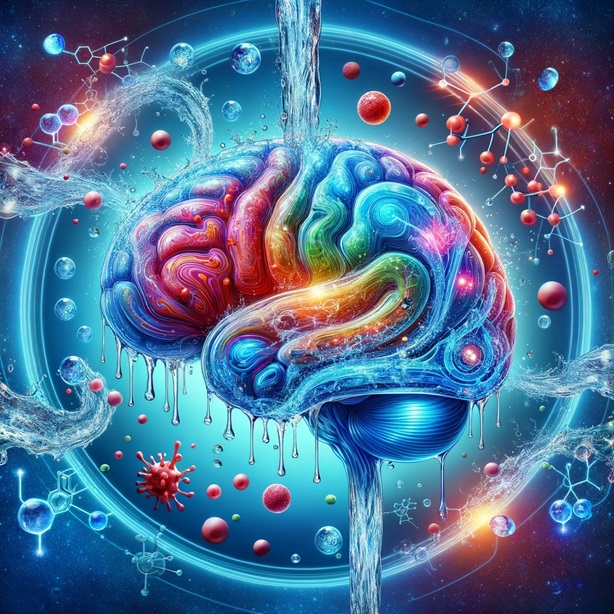The Vital Role of Water in Brain Health
Water's role in the body transcends basic hydration. It is a crucial element that supports the brain's structure and function. Water facilitates the production of energy in the brain cells and is a component of the cerebrospinal fluid, which cushions the brain and spinal cord. It regulates the production of hormones and neurotransmitters, while also being instrumental in flushing out toxins and providing the brain with the nutrients it requires. Additionally, water helps maintain the brain's temperature and volume, which are vital for optimal cognitive function and mental clarity.
Proper hydration is essential for maintaining the brain's electrical activity and supporting neuronal communication, which are crucial for cognitive processes such as memory, attention, and executive function. Without adequate water intake, the brain's efficiency and performance can decline, leading to cognitive impairments and mental fatigue.
Cognitive Consequences of Inadequate Hydration
Dehydration's impact on cognition is more significant than many realize. It can lead to decreased focus, memory lapses, and slowed reaction times. Studies have shown that even mild dehydration can impair cognitive functions across all age groups, with particularly pronounced effects in the elderly and children, whose cognitive functions are more susceptible to fluctuations in hydration. Inadequate hydration can also exacerbate mood disorders, such as anxiety and depression, further impacting cognitive health.
Chronic dehydration can lead to long-term cognitive deficits, affecting brain structure and function. For example, prolonged dehydration can reduce gray matter volume, impair synaptic plasticity, and increase the risk of neurodegenerative diseases. These effects highlight the importance of maintaining proper hydration for cognitive resilience and brain health.
Hydration and Cognitive Performance: The Science Explained
Scientific research has uncovered that proper hydration correlates with increased blood flow to the brain. This leads to more oxygen and nutrients being delivered, which are necessary for cognitive functions. Brain imaging studies have revealed that dehydration reduces brain volume, affecting the way the brain operates and processes information. These changes can impair cognitive performance, particularly in tasks requiring attention, working memory, and executive function.
Hydration also influences neurotransmitter synthesis and release, which are critical for cognitive function and emotional regulation. Proper water intake supports the production of key neurotransmitters, such as dopamine and serotonin, enhancing mood and cognitive performance. Furthermore, hydration helps remove metabolic waste products from the brain, preventing their accumulation and potential neurotoxic effects.
Recommended Water Intake for Cognitive Health
The amount of water needed to maintain cognitive performance varies by individual. Factors such as age, gender, weight, climate, and activity level play a role in determining the appropriate water intake. Generally, the '8x8' rule, which suggests eight 8-ounce glasses of water per day, is a good starting point, but one should also listen to their body and adjust accordingly. For example, individuals engaging in intense physical activity or living in hot climates may require more water to stay properly hydrated.
Other factors, such as diet and health conditions, can also influence water needs. Foods with high water content, like fruits and vegetables, contribute to hydration, while diuretics, such as caffeine and alcohol, increase water loss. Health conditions, such as kidney disease or heart failure, may require tailored water intake recommendations, highlighting the importance of individualized hydration strategies for cognitive health.
Enhancing Cognitive Functions Through Hydration
Consistent water intake can enhance various cognitive functions. It supports working memory, keeps attention span optimal, and aids in the complex problem-solving process. For tasks that require prolonged focus and vigilance, staying hydrated can result in better performance and more accurate results. Proper hydration also supports cognitive flexibility, allowing individuals to adapt to changing tasks and demands, and emotional regulation, promoting a positive mood and reducing stress.
In addition to enhancing cognitive performance, hydration can also protect against cognitive decline and improve brain resilience. Regular water intake supports neuroplasticity, the brain's ability to reorganize and adapt, which is crucial for learning, memory, and cognitive health. By maintaining proper hydration, individuals can enhance their cognitive function and protect their brain health throughout life.
Recognizing and Responding to Dehydration
Identifying signs of dehydration is key to preventing cognitive decline. Symptoms may include thirst, dry mouth, fatigue, headache, and a decrease in urine output. Upon noticing these signs, it is important to drink fluids or eat water-rich foods to rehydrate the body promptly. Severe dehydration can lead to confusion, dizziness, and fainting, requiring immediate medical attention.
Staying aware of hydration levels throughout the day can prevent dehydration and its cognitive consequences. Keeping a water bottle handy, setting reminders to drink water, and monitoring urine color can help maintain proper hydration and support cognitive health.
Hydration Strategies for Optimal Cognitive Function
Incorporating hydration habits into one's daily routine can be done by starting the day with water, replacing lost fluids after exercise, and eating hydrating foods like cucumbers, tomatoes, and watermelons. Additionally, understanding personal hydration needs and responding to the body's cues are essential for maintaining cognitive health. Herbal teas, coconut water, and infused water can also provide hydrating alternatives to plain water, making hydration more enjoyable.
Creating a hydration routine, such as drinking water before meals or carrying a water bottle, can make proper hydration a habit and prevent cognitive impairments due to dehydration. Adjusting water intake based on activity level, climate, and health conditions can also optimize hydration for cognitive function and overall well-being.
Conclusion
Hydration stands as a pillar of cognitive well-being. An adequate intake of water is a simple yet effective tool for enhancing mental performance and safeguarding long-term cognitive health. By understanding the importance of hydration and adopting practices to ensure proper water intake, one can support their brain's functioning and unlock their full cognitive potential. Regular hydration, combined with a balanced diet and healthy lifestyle, can enhance cognitive resilience and promote brain health throughout life.
